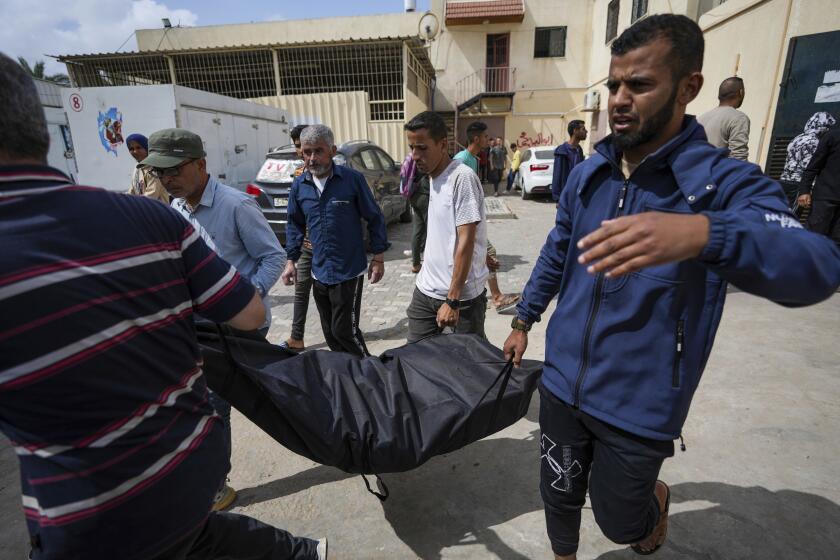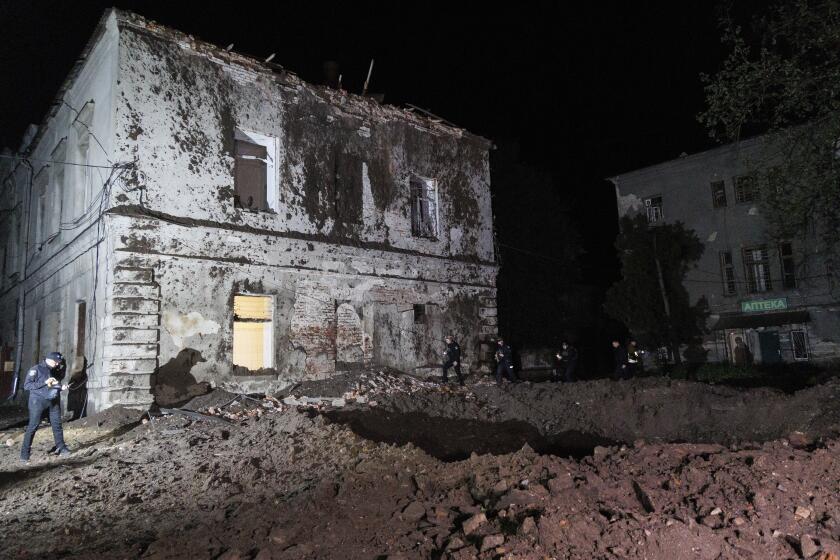Motherly Love Brought Her to Base in Tikrit
Anabel Valencia crossed oceans, deserts and half the globe to see her daughter, Spc. Giselle Valencia, a truck driver with Task Force Iron Horse here in Saddam Hussein’s old neighborhood.
But you just don’t drop in at a heavily guarded U.S. military base in a war zone, even if your kid is on active duty inside.
“Your daughter’s on a mission,” an incredulous military police officer holding a fierce German shepherd advised Valencia on Friday.
“I can wait,” came the reply from the Tucson teacher’s aide and mother of three. “I came this far. I can wait a bit longer.”
Valencia, 51, born in Boyle Heights, was one of a handful of parents who traveled to Iraq this week to see their active-duty children. Another parent, Fernando Suarez del Solar, from Escondido, gathered sand from the spot where his son, Marine Lance Cpl. Jesus Alberto Suarez del Solar, was killed in March.
The trip was sponsored by Global Exchange, a San Francisco-based activist group that opposed the U.S. invasion and is eager to spread its antiwar message. None of the parents had formal military clearance to visit their soldier children.
Anabel Valencia’s trip provided an offbeat glimpse into the U.S. occupation in this former Baath Party stronghold.
“I’m glad we came and got rid of Saddam Hussein -- he was a dictator and oppressed his people,” said Valencia, who also has a son, Chuveny Valencia, 22, who is deployed in Baghdad. “But now I think it’s time for the troops to come home and for the Iraqis to govern themselves.”
The mother says she hasn’t seen her daughter, Giselle, in three years. Giselle was stationed in Germany before being deployed to Kuwait and then Iraq this spring. Giselle dropped out of community college and worked part time at Kentucky Fried Chicken and a discount clothes outlet before joining the Army, her mother said.
Valencia informed both of her children of her intention to travel to Iraq. Both had the same reply: Stay home.
“They thought it was a crazy idea,” Valencia said.
Valencia left her Baghdad hotel Friday after breakfast accompanied by two veteran activists, one of them Medea Benjamin, a former California Green Party candidate for U.S. Senate and the founding director of Global Exchange. They set out for the two-hour drive to Tikrit on what has become one of Iraq’s most dangerous roads, a major north-south artery for U.S. military convoys that is the site of frequent attacks and ambushes targeting soldiers and Westerners in general.
On the way up, the car carrying Valencia passed what appeared to be a military vehicle ablaze off the side of the road. “I hope no one was hurt,” she said.
The entourage arrived without incident slightly after midday at the gate of the sprawling compound of Task Force Iron Horse, led by the Army’s 4th Infantry Division force that occupies some of the toughest turf in the so-called Sunni Triangle. The MP with the German shepherd informed Valencia that her daughter had just decamped, driving a truck with a convoy en route to Baghdad.
“I came all this way to see her,” Valencia pleaded with the officer, who was polite, but unyielding.
“She’s in the military, ma’am,” said the MP, who declined to give his name. “She’s doing very well. She’s in excellent health.” Valencia was determined to stay put until her daughter arrived, even though she was warned about the danger of traveling after dark.
“I’m not leaving,” she declared, her entourage now expanded as journalists working out of the base joined the scene. “We can stay right here tonight.”
Officers from the U.S.-trained Iraqi police arrived in blue and white cruisers after hearing of the incident.
“We have orders to arrest any protesters,” explained Capt. Mohammed Ali Hussein of the regional police in Tikrit.
His demeanor soon softened. A dialogue ensued.
“I think it’s terrible that the Americans will not let you in to see your beloved daughter,” Capt. Hussein said. “This is the way they treat their own people! Imagine how they treat us.” As the conversation continued along such lines, military convoys lumbered into and out of the gates. Black Hawk and Apache helicopters buzzed overhead, following the route of the nearby Tigris.
Valencia was soon sharing with the police photos of her daughter in uniform -- in one Giselle is behind the wheel of a military semi; in another she is seated on a plush red couch in one of Saddam Hussein’s former palaces.
Valencia became teary-eyed. Two cops offered tissues. They were U.S.-trained and are paid by the ruling U.S.-led coalition, which regularly praises Iraqi police as the coalition’s crucial ally. But these two weren’t exactly with the program.
“The Americans promised so much: democracy, freedom, security -- now we have none of these things,” said Capt. Mazen Ayash Youssif. “We were better off before. We all prefer the time of Saddam.”
The depth of their anti-U.S. conviction underscores the difficulties the military faces in winning over ordinary Iraqis, especially in the Sunni zone of central and western Iraq favored by the former regime.
“If this is the way the people think here,” concluded Valencia, “then we’re in a lot of trouble.”
One officer said he now has two likenesses of Saddam Hussein hanging in his home, one up from before the U.S. invasion. All said the former strongman would easily triumph in any democratic election -- a perception not much evident beyond the borders of Tikrit, even among many other Iraqis fed up with the occupation.
“But you were liberated from a dictator,” said Benjamin, the activist, taken aback at the direction the dialogue was taking.
Replied another officer, Mohanan Majeed Taha: “We never asked anyone to liberate us. What right did the Americans have to liberate us?”
With the day slipping away, Army Lt. Nathan Carver approached. He informed Valencia that her daughter might not return until late, or perhaps the next day. The officer suggested that she go back to Baghdad for the evening and return today, when a visit probably could be arranged.
“I’m so happy,” said a relieved Valencia. “Now I believe I will see her.”
As nightfall approached, Capt. Hussein offered to put Valencia up at the police station and invited her to his home for a dinner of roasted sheep. “If the Americans won’t let you in, we will show you Arab hospitality,” he explained. But Valencia turned him down and headed back to Baghdad.
“I hope your daughter treats our people well, not like the other Americans,” said Capt. Hussein before leaving. “Then she will be treated well in return, and God willing, remain safe.”
More to Read
Start your day right
Sign up for Essential California for news, features and recommendations from the L.A. Times and beyond in your inbox six days a week.
You may occasionally receive promotional content from the Los Angeles Times.






